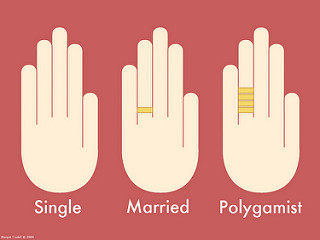Does the Bible Support Polygamy?

Anyone familiar with the Bible has had to wrestle with the question of polygamy in the Old Testament. There are numerous examples of polygamy. Some of these polygamous relationships are even practiced by those whom we would consider important people in Scripture. For example, Jacob (a patriarch of Israel) had two wives, Leah and Rachel (Gen 29). Similarly, David, a man after God’s own heart, had multiple wives. These stories give us pause. Why are there faithful Israelites who have multiple wives? Although many would reject polygamy today, some are willing to say the Bible still supports polygamy today.
The First Mention of Polygamy
Although the Old Testament has concrete examples of polygamy, these are not looked upon favorably in the Old Testament. Where polygamy exists, family strife and difficulty follows. The strife and rivalry between Rachel and Leah is well known to students of Scripture (cf. Gen 29-30). The story of Joseph itself is a testament of this rivalry and family strife (Gen 37:3-4).
In fact, in light of Genesis 2 and its description of the Edenic ideal of marriage, it is likely no accident that one of the details given that reflects Lamech’s departure from a God-pleasing lifestyle is his polygamous lifestyle (Gen 4:19–22). In other words, polygamy is first mentioned as a description of someone who has completely rebelled against God.
Polygamy and the Old Testament Picture
Another important factor to consider is that there are not as many examples of polygamy mentioned in Scripture as often implied by those who make such observations. Furthermore, most of the polygamous relationships described are not challenged because many of those relationships are held by people who were in absolute power (like a ruler or a king).
Despite the occurrence of narratives describing polygamy, two significant passages demonstrate that polygamy was never God’s plan for creation. First, the creation narrative in Genesis 2 represents marriage as one man and one woman. Singular nouns and pronouns are utilized throughout, and the man and woman are described as corresponding singularly to each other. It is also interesting that the LXX translation of Genesis 2:24b adds “the two of them” (οἱ δύο) to the phrase “they will become one flesh” (εἰς σάρκα μίαν). This addition of the word “two” occurs also in other ancient translations (the Peshitta and Vulgate). This addition indicates that the translators saw the importance of emphasizing “twoness” in the creation narrative relating to marriage.
Second, Deuteronomy 17:17 indicates that Israel’s kings were not to have multiple wives. Although the reason for this was likely to avoid making forbidden alliances with other nations, the Israelite king was also to be an example for the rest of Israel. Thus, if polygamy was forbidden for the king, it would make no sense to encourage the practice among other Israelites.
Nonetheless, we do have examples of polygamy. Why were these examples of polygamy tolerated by God? Here we can draw some similarity with the issue of divorce. Although divorce was tolerated in the Old Testament (cf. Deut 24:1–4), Jesus made clear that this was due to the hardness of Israel’s hearts, and that divorce ought to only be allowed in cases of sexual immorality (Matt 19:8). Thus, we have an example of a practice which was tolerated and yet Jesus had to correct the cultural perception of what was right.
In a similar sense, although polygamy was tolerated in the Old Testament, this does not mean it was in accordance with God’s design. Rather, as noted above, the Old Testament provides evidence for the fact that polygamy should be viewed as a subversion of God’s design for marriage which departs from God’s creation ideal of one man and one woman.
One Comment
Dwight Osborne
Of course not, the Bible says nothing to support polygamy. God’s standard has always been and will always be one husband and one wife. Just because the Bible records the current circumstances and sins of that day doesn’t lend credence to the practice. Lamech was the first to break God’s standard and he lived with the consequences. It simply all comes down to Genesis 6:5, “The Lord saw that the wickedness of man was great in the earth, and that every intention of the thoughts of his heart was only evil continually.” Also, the 3 verses written later of condemnation in Judges would apply, that everyone did what was right in their own eyes. We suffer the same malady today here in the US.